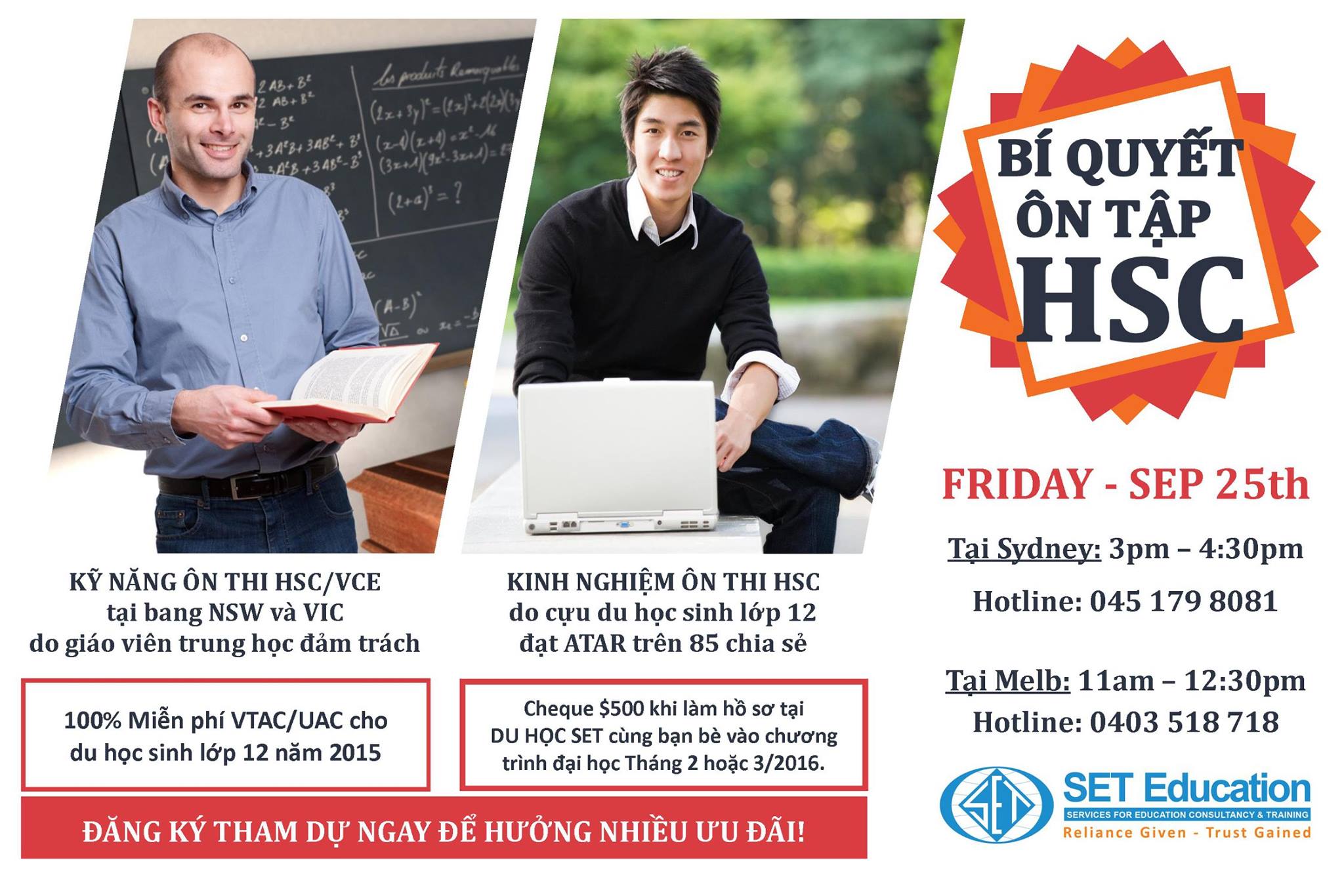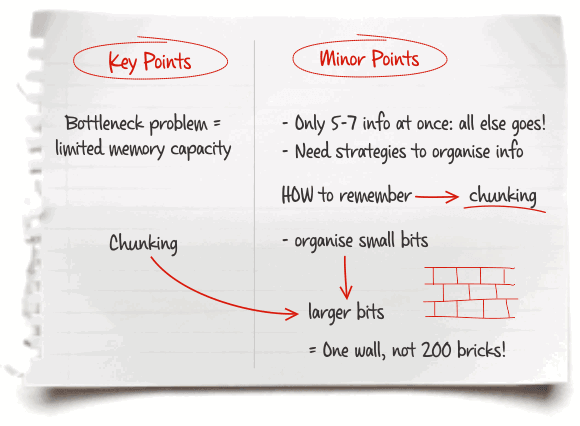
Bí quyết ôn tập cho kỳ thi tốt nghiệp trung học HSC và VCE dành cho du học sinh Úc
Cũng như ở Việt Nam, kỳ thi tốt nghiệp trung học tại Úc chính là một trong những bước ngoặt quan trọng cho các bạn du học sinh lớp 12, quyết định việc lựa chọn trường và chuyên ngành bạn sẽ theo đuổi trong tương lại. Vậy làm thế nào để có thể ôn tập và chuẩn bị cho kỳ thi một cách hiệu quả nhất? Dưới đây là một trong số những bý quyết giúp bạn thành công hơn. Cùng xem nhé:
1. Khi nào thì bắt đầu ôn tập?
NGAY BÂY GIỜ!
Hãy lên thời khóa biểu những việc bạn sẽ làm bằng cách:
– Nhìn lại thời gian bạn đã sử dụng đã hợp lý chưa? Thời gian đi đâu hết rồi?
– Xem xét các môn học về mức độ khó dễ, nội dung cần phải đọc và học để xác định thời gian cần sử dụng cho từng môn học, từ đó bạn có thể sắp xếp được thời gian cần sử dụng cho môn học đó, và thứ tự ưu tiên
– Luôn luôn nhìn lại bảng thời khóa biểu sau 1 – 2 tuần để từ đó thay đổi lại cho phù hợp

2. Chuẩn bị góc học tập:
– Hãy tìm một góc học tập thật thoải mái và yên tĩnh, đầy đủ ánh sáng và không khí lưu thông. Điều này tăng tính tập trung của bạn hơn
– Đảm bảo chỗ học của bạn chỉ có những gì liên quan đến việc học của môn bạn đang học thôi, để không bị mất tập trung
– Hãy chuẩn bị đầy đủ các dụng cụ học tập bạn cần luông trong tầm với để giảm thời gian tìm kiếm đồ, tăng khả năng tập trung và việc học được hiệu quả nhất

3. Thay đổi nhiều hình thức học:
– Để tránh cảm giác nhàm chán, bạn có thể thử thay đổi một số các học tập hiệu quả với bạn: đọc sách tại bàn, đứng dậy và tưởng tượng mình đang thuyết trình, liên tưởng nội dung học với một nội dung gần gũi để tăng khả năng tưởng tượng, từ đó thông tin được tiếp thu và lưu trữ lâu hơn
– Vào những tuần cuối, đừng cố gắng nhồi nhét thêm thông tin mới, thay vào đó hãy ôn lại những kiến thức bạn đã biết
– Hãy tìm cảm giác tự hào về một nội dung bài học khó nào đó mà bạn đã rất thuần thục, từ đó tăng thêm tinh thần và sự tự tin của bạn để có thể tìm hiểu thêm những kiến thức khác

3. Bạn không thể nhớ tất cả đâu nếu chỉ nghe mà không viết lại!
– Ghi chú những ý quan trọng mà giáo viên đã từng nói qua trong lớp.
– Ghi chú theo ngôn ngữ của riêng bạn để khi nhìn thấy nó bạn hiểu ngay và có thể liên tưởng được nội dung bài
– Highlight những phần quan trọng như là một dạng summary để khi cần bạn chỉ cần đọc những nội dung chính mà không mất thêm thời gian tìm kiếm
– Hãy thử các bài kiểm tra của năm cũ để làm quen với dạng câu hỏi kiểm tra
– Liên tưởng và liên kết thông tin để có thể nhớ một nội dung lâu hơn: vd: để nhớ số “08301974” bạn có thể tưởng tượng đó là một câu chuyện diễn ra vào “08:30am năm 1974”
– Ngủ đủ giấc và ăn uống điều độ cũng giúp tăng cường trí nhớ

4. 6 tuần trước ngày thi:
– Nhìn lại tiến độ ôn tập
– Rá soát lại các lỗ hổng kiến thức nếu có để tìm kiếm sự hỗ trợ từ giáo viên, bạn bè
– Thử kiểm tra kiến thứ của bạn ở một vài chủ đề
– Tập trung ôn tập: từ vựng, định nghĩa, công thức, biểu đồ, các nội dung tóm tắt
5. 2 tuần trước ngày thi:
– Hãy tuân thủ theo thời khóa biểu đã đặt ra
– Thay đổi hình thức ôn: không chỉ đọc thầm, thay vào đó thuyết trình và tập làm các bài kiểm tra
– Khi gặp câu hỏi khó, hãy ghi xuống những ý và từ bạn có thể liên tưởng đến nó, từ đó sẽ kéo thêm những ký ức về chủ đề đó
– Nếu vẫn chưa giải được, hãy chuyển sang câu kế tiếp để tìm kiếm động lực và có thể những câu kế tiếp cho bạn được ý tưởng nào đó liên quan
– Dành thời gian để nghỉ ngơi và tập thể dục nữa nhé để giữ sức khỏe và tinh thần!
source: Boreofstudy
Ngoài ra, bạn có thể tham dự buổi chia sẻ bý quyết ôn tập thi HSC và VCE DU HỌC SET tổ chức vào 25/9/2015 nữa đấy:

| MELBOURNE | SYDNEY | |
| Thời gian: | 11am – 12:30pm thứ Sáu, 25/09/2015 | 3pm – 4pm thứ Sáu, 25/09/2015 |
| Địa điểm: | Vp DU HỌC SET – SYDNEY: Suite 3, level 2, 300 Chapel Road South, Bankstown, NSW 2200 Tel: 0292991133 | Vp DU HỌC SET – MELBOURNE: Suite 212, level 2, 343 Little Collins Street, Melbourne, Vic 3000 Tel: 0385892402 |
| Đăng ký tham dự | Nhắn tin đến số 0451798081 với nội dung “HSC SET 25/9” | Nhắn tin đến số 0403518718 với nội dung “VCE SET 25/9” |
Nội dung buổi chia sẻ sẽ bao quát các nội dung:
– Kỹ năng ôn thi cho kỳ thi HSC/VCE tại bang NSW và VIC do giáo viên trung học đảm trách
– Những phần chú trọng khi ôn tập môn Toán do giáo viên trung học chuyên Toán đảm trách. Nếu bạn có khúc mắc về bất kỳ chủ đề nào của môn Toán cần hỗ trợ, giáo viên có thể giúp bạn ngay trong buổi này
– Kinh nghiệm ôn thi HSC do cựu du học sinh lớp 12 năm 2014 đạt ATAR trên 90
Học bổng dành cho du học sinh lớp 12:
– Hỗ trợ phí VTAC/UAC hoàn toàn miễn phí cho du học sinh lớp 12 trong năm 2015. Nếu bạn đã đóng phí này, SET sẽ hoàn lại cho bạn.
– Cheque $500 khi làm hồ sơ nhập học cùng ít nhất 1 người bạn vào chương trình đại học kỳ nhập học tháng 2 hoặc 3/2016 tại DU HỌC SET
| WHEN SHOULD I START STUDYING |
| Start NOW!!! |
| Here’s 6 steps to get you started… |
| 1. Decide that time-management is important – it enables you to satisfy, efficiently and effectively your needs and wants. |
| 2. Evaluate your study needs – requirements for each subject in terms of assignments, difficult of subject, etc…. |
| 3. What are you doing now – analyse your current time usage, where does your time go? |
| 4. Plan a new timetable. What is the purpose of a timetable? EFFICIENCY, ORGANISATION, CONCENTATION. |
| 5. Revise that timetable – after 1 to 2 weeks. |
| 6. Set us a special pre-exam timetable. |
| PREPARING TO STUDY |
Find a good place to study. This means a desk with nothing on it except what you need for the task you are going to work on. Move everything out of the way. You want to concentrate on one thing: STUDYING. Have a regular time and place for studying. Make sure you have the following:
|

| APPROACHES TO LEARNING FOR HSC STUDENTS |
|
| STUDY HINTS |
| 1. LISTEN ACTIVELY in class, using four steps – TILE (tune-in, investigate, listen, estimate). |
| 2. Make active NOTES, in your own words, in class, highlighting points by using headings, sub-headings, underlining and diagrams (avoid sentences). |
| 3. Re-read your notes as soon as possible and make a SUMMARY on the back of the page. |
| 4. A SUMMARY must be brief and must act as a key to recalling other material. |
| 5. Make a further brief OUTLINE of the summary, listing only key headings. |
| 6. REVISE the material several times, well in advance of exam time. |
| 7. Make a REVISION STUDY TIMETABLE. |
| 8. When REVISION, use active methods – questioning: looking at how the topic is organised; pretending to explain it to someone else; imagining the exam questions you might get; etc… |
| 9. PERSONALISE the material (give it your frame of reference and your associations). |
10. Use memory tools for complex lists, such as:
|
| 11. When READING (notes from textbook) read with a purpose. |
| 12. Have your notes in clearly labelled folders in a quiet, well-lit, comfortable, tidy and friendly area |
| 13. Practice a RELAXATION technique daily and start revision sessions with it. |
| 14. Be aware of NEGATIVE thoughts. Allow the thought to finish. Then repeat a positive statement to yourself. If a negative thought persists, then use your positive statement as a daily GOAL or AFFIRMATION. |
| 15. Five weeks before EXAMS are due, make a new revision timetable, allocating times to cover various topics and subjects. |
| 16. Now REVISE by using tour notes, summaries and outlines together. |
| 17. Avoid last minute CRAMMING as much as possible. Keep your sleep, relaxation and recision in balance. |
| 18. ANTICIPATE the EXAM PAPER format (using past papers) |
| 19. IN THE EXAM, read actively (underline key words; allocate time to various parts of the paper; write rough point outlines of essay answers) |
| 20. When writing ESSAYS, have a clear INTRODUCTION, BODY and CONCLUSION. State how you will answer the question and what points you intend to make. (Don’t just tell a story or list your information without regular reference to the question.) Use your information to SUPPORT your points. |
| 21. Keep and use your sense of humour. |
| TIMETABLE / SCHEDULE | ||||||||||||||||
| With a timetable or schedule, you will be able to keep track of work that needs to be done. You may order the tasks which have more priority over others and it will help you keep focus on what you have to be doing. It is important you keep track of every single task you have. | ||||||||||||||||
| You may have a very open timetable, which just states the task given and the due date, or you may have a very specific timetable which is very detailed and tell you exactly what needs to be done on what day during a certain time period. | ||||||||||||||||
| With a timetable you will be able to manage time effectively, allowing you to have more freedom while achieving your tasks. | ||||||||||||||||
Example of an Open timetable:
| ||||||||||||||||
STUDYING (at school)top
| LISTENING |
Listening can sometimes be the hardest skill of all to learn and to refine. Think about it. When your teacher is bawling you out for something, how often do you actually listen? Most of the time your brain has gone off duty while your mouth is saying ‘Yeah, yeah, yeah, I know’. How often, when you’re bored in class, have you drifted off into a daydream, only to come back to consciousness and realise that you haven’t heard a thing? Listen consciously, actively, to everything that’s said to you. Even though you won’t like some of it, you will remember it. Try listening for ten minutes to a conversation on the bus, or perhaps between your parents. Then sit down and write down the major points of the conversation. This will begin to fine tune your listening skills so that even boring material delivered in class is recalled easily.
|
| TAKING NOTES |
Especially when we’re young, we think we’ll remember information just by listening. This may be true to a certain extent, but it won’t earn you the highest HSC score you deserve. In class, while you’re reading, while you’re studying, take notes constantly. This doesn’t mean writing down everything you hear or read. It means taking down the most important points in your own words. At the end of the day, read through your notes and revise them. Mark key points wind important facts with a highlighter. File the notes in organised folders.
|
| HOW TO IMPROVE YOUR MEMORY |
|
EXAM PREPARATION top
| All year round >> Six weeks before the exam >> Two weeks before >> Just before >> In the exam room |
All Year Round
Six Weeks Before The Exam
Two Weeks Before
|

| HOW TO RELAX ON EXAM DAY |
|
SOURCES top
- http://www.how-to-study.com
- “Succeed In Exams, Triumph In Tests” by Jean Robb and Hilary Letts (Hodder Headline Australia)
- Sunday Life from The Sunday Telegraph, April 2
- http://www.e-study.com
- “Focus on HSC: parents and student lecture” by EdAssist, University of Sydney
- “Excel HSC Survival Guide” 2001 Edition
